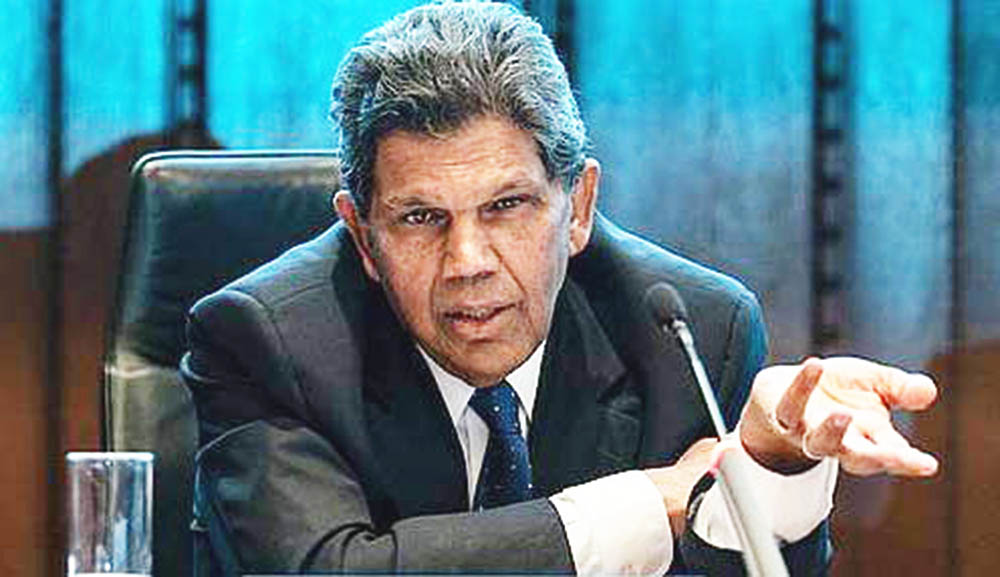By Dr Bertrand Ramcharan Former UN Under-Secretary-General
Seventh Chancellor of the University of Guyana Previously Director of the International Conference on the Former Yugoslavia (1992-1996)
Wars end in one of three ways: victory/defeat; stalemate; or negotiated outcomes. Holsti documented that the majority end in stalemates.
Whichever way the current Russo-Ukraine conflict will end, it is time to empanel an international conference on Ukraine. We draw here on our nearly four years as Director of the International Conference on the Former Yugoslavia, and on our related book, International Peace Conferences.
Saudi Arabia recently convened a meeting of the national security advisers of some forty countries, with the announced aim of endorsing the peace plan of President V. Zelensky. It is of some value that these representatives got around the table to discuss the conflict. But for the initiative to have any future it should evolve into an international peace conference.
The most important feature of any peace initiative is that the leaders must be impartial and must be seen to be impartial. The question presents itself for reflection: can an effort ostensibly with the goal of endorsing the plan of one side succeed? Especially if two elements of the plan include complete withdrawal from all Ukrainian territories and the prosecution and punishment of those who started and conducted the war?
Brazil was present at the meeting in Saudi Arabia and the foreign policy advisor to President Lula, my friend Celso Amorim, has been ardently calling for a peace process. Brazil, and its neighbour Guyana, soon to be a member of the UN Security Council, will need to think through the contours of a peace process.
The UN Secretary-General, Antonio Guterres, has been trenchantly critical of Russia’s invasion of Ukraine and its subsequent actions, and is probably not best placed to lead a peace initiative himself. I had earlier advocated in these pages that the President of the UN General Assembly should designate a Special Representative to help facilitate a peace process. Things may now have gone beyond that stage.
The idea we would put forward for consideration is the establishment of an International Conference on Ukraine, co -chaired by Special Representatives of the United Nations and the Non-Aligned Movement, to help facilitate a peace process in respect of the situation in Ukraine.
In 1992, in the midst of the wars then raging in the former Yugoslavia, the UN Secretary-General and the then British Prime Minister, acting in his capacity as the rotating Chairperson of the European Union, convened the London Conference on Yugoslavia in August of that year. That conference decided to establish the International Conference on the Former Yugoslavia, based in Geneva, formally co-chaired by the UN Secretary-General and the rotating Chairperson of the European Union.
The Conference had a Steering Committee consisting of some thirty States, co-chaired by representatives of the UN and the EU. The first two co-chairs were former US Secretary of State Cyrus Vance, and former UK Foreign Secretary Lord David Owen. These two Co-Chairs were the lead peace negotiators. They were supported by six Working Groups chaired by highly qualified statespersons, including subsequent Nobel Peace Prize winner, my friend Martti Ahtisaari.
There was a small Secretariat, of which I was Director. The budget of the conference was presented to, and approved by, the Steering Committee, whose members contributed according to an agreed scale.
The Conference ran from September, 1992 until May, 1996. I was present as political / legal adviser at the major meetings and drafted the reports submitted to the Security Council. These are assembled in a two volume collection I Edited, The International Conference on the Former Yugoslavia: Official Papers.
At the outset of the conference, Cyrus Vance and Lord Owen declared their impartiality as a matter of principle but also announced their intention of contributing to the roll-back of ethnic cleansing that had taken place during the conflict. This was a delicate balance: impartiality in principle with a commitment to human rights.
Over the four years of the Conference’s existence, the peace negotiators had one immediate success, the preventive deployment of UN peacekeepers in Macedonia, and they carefully assembled the building blocks of future peace agreements in other parts of the former Yugoslavia. The 1995 Dayton Peace Accord on Bosnia built on the building blocks of the Yugoslav conference. I myself passed on the relevant papers to the US State Department, and I was present at the Dayton conference and can attest to this. The Yugoslav Conference negotiators successfully negotiated the eventual agreement ending the conflict in Eastern Slavonia in Croatia. And the Yugoslav Conference negotiators stitched together packages for the protection of human and minority rights in different parts of the former Yugoslavia.
In suggesting the establishment of an International Conference on Ukraine, we have in mind these two elements: efforts that can attenuate particular situations straightaway, such as the preventive deployment of peacekeepers in Macedonia; and the gradual assembling of building blocks for peace through patient work with the parties and others in a position to assist.
One should not go into peace negotiations with pre-arranged packages. One should strive to build them up, block by block, so that they can be put together when the parties are ready, or circumstances permit.
I have described the organization and work of the International Conference on the Former Yugoslavia in some detail in my book on International Peace Conferences. Based on this experience, one could distil the following elements for a possible International Conference on Ukraine.
First, it could be formally Co-Chaired by the United Nations Secretary-General and the Chairperson of the Non-Aligned Movement. Each would represent his or her organization.
Second, there could be a Steering Committee consisting of some thirty to forty Governments, who would bear the running costs of the operations of the conference.
Third, the Steering Committee could be co-chaired by two Special Representatives designated, respectively, by the Secretary-General and the Chair of the Non-Aligned Movement.
Fourth, the two Special Representatives could decide later on the need for specialized Working Groups. Unlike the Yugoslav Conference, which had six Working Groups from the start, the two Special Representatives could determine the need for such working groups as their efforts develop.
Fifth, there could be a modest Secretariat of the International Conference on Ukraine.
We have suggested that the International Conference on Ukraine be co-chaired by the UN and the Non-Aligned Movement because the UN is the foremost legitimizing organization of the international community, and the Non-Aligned Movement embraces countries the majority of whom are equidistant from the two protagonists to the conflict involving Ukraine.
We have offered this piece in good faith, as a gesture towards Guyana and its neighbour Brazil. Brazilian President Lula has championed the cause of peace ever since his return to office, ably supported by Celso Amorim. Guyana will soon occupy a seat on the Security Council and, in a functioning democracy, its policies on the Council should reflect the wisdom and good sense of Guyanese.
Guyanese should share their views on such matters.









